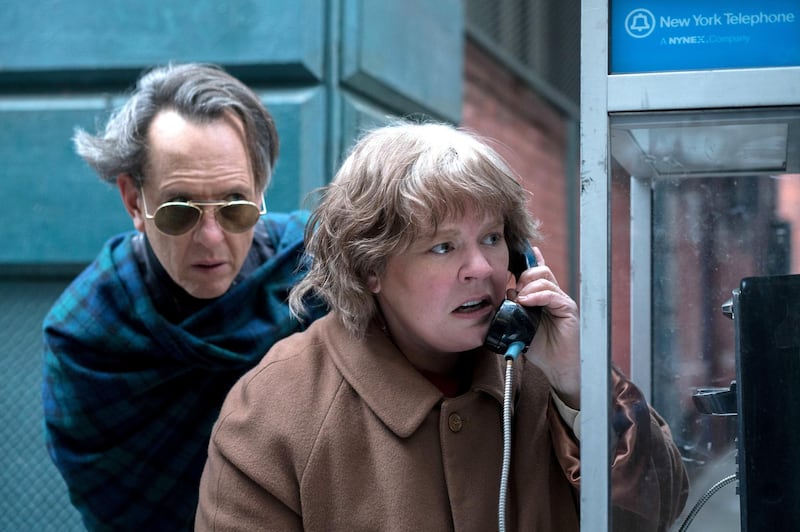Putting a video online showing how elated you are at receiving an Oscar nomination seems to be a favourite pastime with nominees this year.
BlacKkKlansman director Spike Lee was watching in his bedroom with his wife and children, while Capernaum director Nadine Labaki made a video call to the film's star Zain, a real-life Syrian refugee now living in Norway.
But none of these could match the sheer exuberance and style of the video posted by Best Supporting Actor nominee Richard E Grant, moments after hearing the good news.
The star of Can You Ever Forgive Me? took a stroll down memory lane by standing outside the West London bedsit that he rented for two years when he first moved from Swaziland to the UK in 1983.
Adorned with a grin a mile-wide, the actor told fans how he rented a room in Notting Hill for the equivalent of $50, and now 36 years later, at almost 62, he was standing there with an Oscar nomination.
The ecstasy is a reflection of the fact that Grant probably thought recognition from the Academy Awards would never come. After all, he has played several memorable roles over a long and distinguished career that didn't get a sniff at the Oscars.
A change in plans
Grant entered into the public consciousness as the foul-mouthed Withnail in the British cult classic Withnail and I. Other wonderful roles included a widowed father in romantic comedy Jack and Sarah and as Larry Lefferts in Martin Scorsese's The Age of Innocence. Francis Ford Coppola cast him as an asylum administrator in Bram Stoker's Dracula, and Grant appeared in three films by the great Robert Altman — The Player, Pret-a-Porter and Gosford Park.
Now we can add Jack Hock in Can You Ever Forgive Me?, the role that finally earned him an Oscar nod. Directed by Marielle Heller, the film is based on a true story about writer Lee Israel, who forged letters between celebrities when her career as a biographer and a writer on celebrity lives began to dry up. So begins a crass attempt to raise some cash by selling the forged letters to unsuspecting buyers, but when suspicions are raised that these notes might be fakes, she enlists the help of her drinking buddy Hock.
It was the chance to work with Melissa McCarthy, who proved she can do drama as well as comedy (McCarthy is up for Best Actress for her role, too), that initially attracted Grant to the movie.
"I was supposed to be going on holiday, when I was called up and asked if I wanted to come to New York to commence a six-week shoot with Melissa McCarthy. I said yes, of course," Grant tells The National.
It wasn't long before he became fascinated by Israel's story.
“She runs into problems when no one wants to publish her work any more. Lee’s problem is that she is a celebrity biographer, but not a celebrity in her own right.”
Grant says it reflected the desires of many writers at the time, when becoming a celebrity biographer offered a chance at fame.
“In the 1970s, for example, when Norman Mailer did a biography of Marilyn Monroe, it became about Norman Mailer’s Marilyn; the author now had to be as famous and celebrated as the stars themselves.”
Finding his way
Both McCarthy and Grant are excellent as the fraudsters, bringing humour and a light touch to the script.
But what's intriguing about Grant's performance is that he gives off the air that playing a fun-loving, rebellious and occasionally deceptive drunk comes easy to him.
The irony of this is that Grant doesn't drink alcohol, as his body is unable to metabolise it.
He's as gregarious in real life as many imagine him; as we sit talking in a Toronto hotel lobby, he even refuses the temptation of tea or coffee as we sit chatting.
He describes growing up in Swaziland, and how he was encouraged to go into acting by his English teacher, but his father was not so sure.
“My father said he wouldn’t pay for me to go to the University of Cape Town, if I went to drama school.”
Not one to be put off, Grant says he found a way to do both and get his father to pay.
“I discovered through an architect who lived in Swaziland, that you could do a combined English degree as well as drama school if our grades were good enough.”
Such tenacity has served him well throughout his career. Recently, he's also appeared in later seasons of hit TV shows Downton Abbey and Game of Thrones.
One suspects that at the Oscars, whether he wins or not, somehow he will be the star of the show; or have the best reactions, at least.












